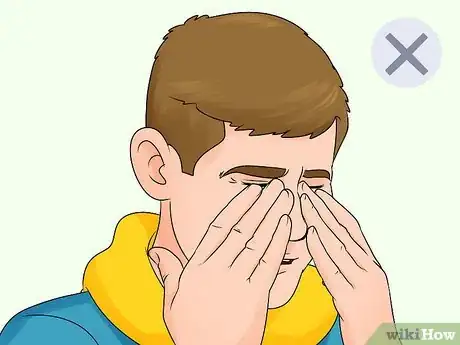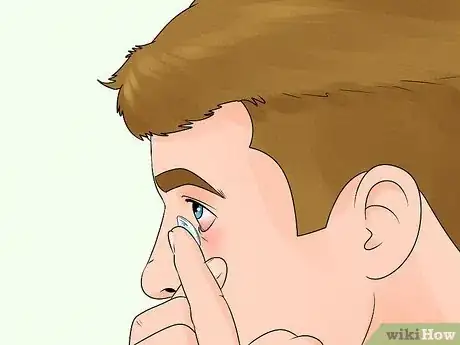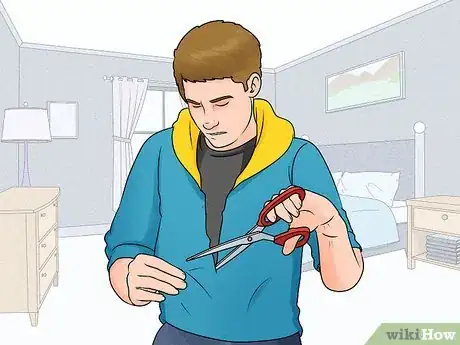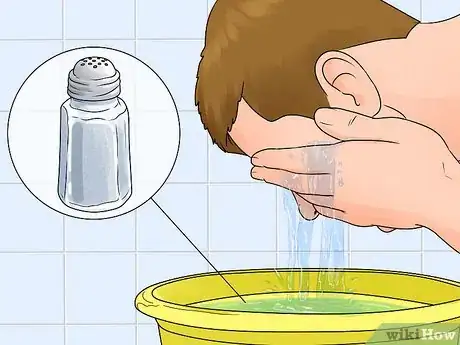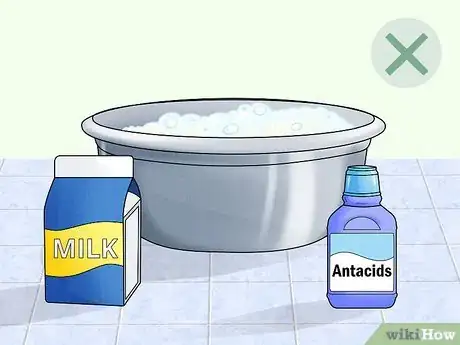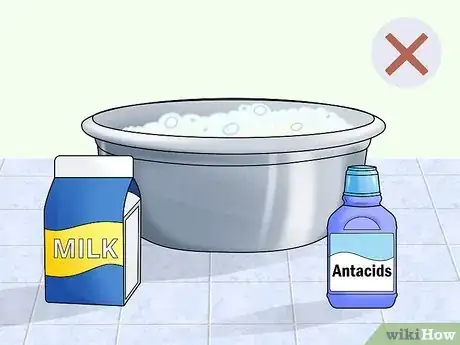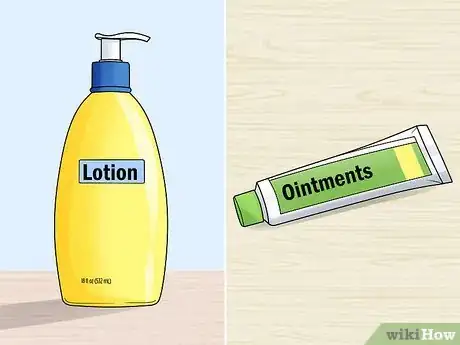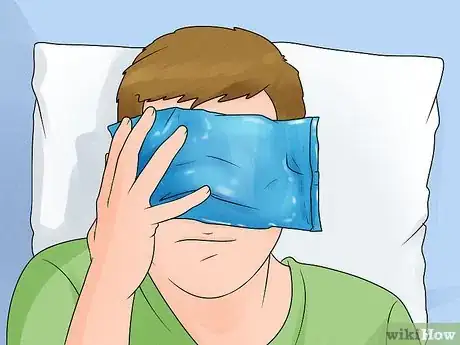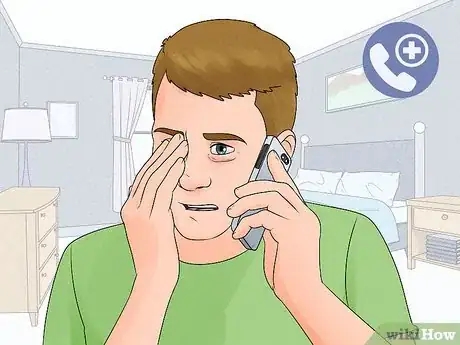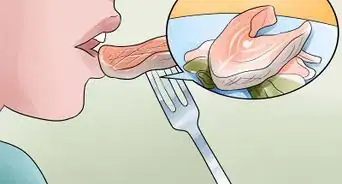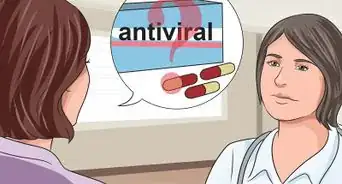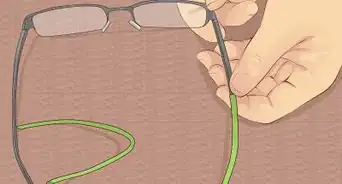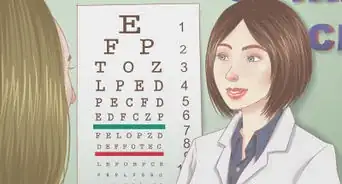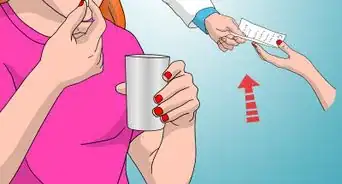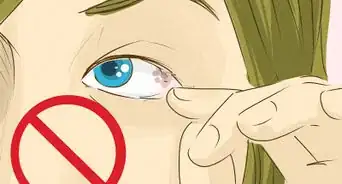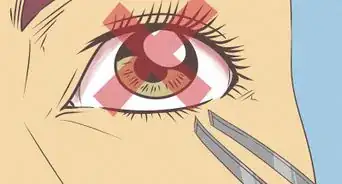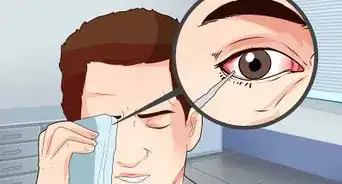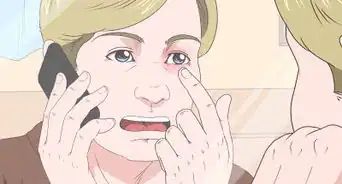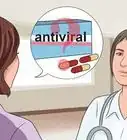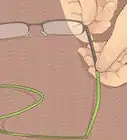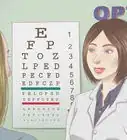This article was co-authored by Kerry Assil, MD and by wikiHow staff writer, Amy Bobinger. Dr. Kerry Assil is a board certified Ophthalmologist and the Medical Director and CEO of Assil Eye Institute (AEI), an ophthalmology practice in Los Angeles, California. With over 25 years of experience and as one of the world's foremost experts in eye surgery, Dr. Assil has trained 14,000+ physicians in refractive and cataract surgery, performed 70,000+ eye surgeries, and authored over 100 textbooks, chapters, and articles on refractive and cataract surgery. He's served as the Distinguished Professor lecturer at Harvard, Johns Hopkins, Duke, Baylor, Tokyo, and UCLA among others. He has served on the advisory boards of 20+ ophthalmic device, pharmaceutical, and scientific companies and has appeared in the media as an authority on advances in vision-restoring surgeries and refractive surgery. Dr. Assil continues to make significant advances in his field with numerous inventions and introductions of state-of-the-art technologies.
There are 10 references cited in this article, which can be found at the bottom of the page.
This article has been viewed 281,466 times.
Getting pepper spray in your eyes can be excruciating. Pepper spray is made from oleoresin capsicum, which is extracted from a very spicy chili. If you get sprayed, it's important to know that even though it painful, it's usually not dangerous and you should start feeling better in about 10-30 minutes.[1] Fortunately, there are things you can do right away to start relieving your discomfort. However, see your doctor if you notice any severe injuries, like abrasions on your eyes or blistered skin, or if you're having trouble breathing.
Steps
Expert Q&A
Did you know you can get expert answers for this article?
Unlock expert answers by supporting wikiHow
-
QuestionDo you have to go back and wash it off?
 Chris M. Matsko, MDDr. Chris M. Matsko is a retired physician based in Pittsburgh, Pennsylvania. With over 25 years of medical research experience, Dr. Matsko was awarded the Pittsburgh Cornell University Leadership Award for Excellence. He holds a BS in Nutritional Science from Cornell University and an MD from the Temple University School of Medicine in 2007. Dr. Matsko earned a Research Writing Certification from the American Medical Writers Association (AMWA) in 2016 and a Medical Writing & Editing Certification from the University of Chicago in 2017.
Chris M. Matsko, MDDr. Chris M. Matsko is a retired physician based in Pittsburgh, Pennsylvania. With over 25 years of medical research experience, Dr. Matsko was awarded the Pittsburgh Cornell University Leadership Award for Excellence. He holds a BS in Nutritional Science from Cornell University and an MD from the Temple University School of Medicine in 2007. Dr. Matsko earned a Research Writing Certification from the American Medical Writers Association (AMWA) in 2016 and a Medical Writing & Editing Certification from the University of Chicago in 2017.
Family Medicine Physician
-
QuestionDo people die from it?
 Chris M. Matsko, MDDr. Chris M. Matsko is a retired physician based in Pittsburgh, Pennsylvania. With over 25 years of medical research experience, Dr. Matsko was awarded the Pittsburgh Cornell University Leadership Award for Excellence. He holds a BS in Nutritional Science from Cornell University and an MD from the Temple University School of Medicine in 2007. Dr. Matsko earned a Research Writing Certification from the American Medical Writers Association (AMWA) in 2016 and a Medical Writing & Editing Certification from the University of Chicago in 2017.
Chris M. Matsko, MDDr. Chris M. Matsko is a retired physician based in Pittsburgh, Pennsylvania. With over 25 years of medical research experience, Dr. Matsko was awarded the Pittsburgh Cornell University Leadership Award for Excellence. He holds a BS in Nutritional Science from Cornell University and an MD from the Temple University School of Medicine in 2007. Dr. Matsko earned a Research Writing Certification from the American Medical Writers Association (AMWA) in 2016 and a Medical Writing & Editing Certification from the University of Chicago in 2017.
Family Medicine Physician
-
QuestionWhat do I do if I get pepper spray in my eyes?
 Kerry Assil, MDDr. Kerry Assil is a board certified Ophthalmologist and the Medical Director and CEO of Assil Eye Institute (AEI), an ophthalmology practice in Los Angeles, California. With over 25 years of experience and as one of the world's foremost experts in eye surgery, Dr. Assil has trained 14,000+ physicians in refractive and cataract surgery, performed 70,000+ eye surgeries, and authored over 100 textbooks, chapters, and articles on refractive and cataract surgery. He's served as the Distinguished Professor lecturer at Harvard, Johns Hopkins, Duke, Baylor, Tokyo, and UCLA among others. He has served on the advisory boards of 20+ ophthalmic device, pharmaceutical, and scientific companies and has appeared in the media as an authority on advances in vision-restoring surgeries and refractive surgery. Dr. Assil continues to make significant advances in his field with numerous inventions and introductions of state-of-the-art technologies.
Kerry Assil, MDDr. Kerry Assil is a board certified Ophthalmologist and the Medical Director and CEO of Assil Eye Institute (AEI), an ophthalmology practice in Los Angeles, California. With over 25 years of experience and as one of the world's foremost experts in eye surgery, Dr. Assil has trained 14,000+ physicians in refractive and cataract surgery, performed 70,000+ eye surgeries, and authored over 100 textbooks, chapters, and articles on refractive and cataract surgery. He's served as the Distinguished Professor lecturer at Harvard, Johns Hopkins, Duke, Baylor, Tokyo, and UCLA among others. He has served on the advisory boards of 20+ ophthalmic device, pharmaceutical, and scientific companies and has appeared in the media as an authority on advances in vision-restoring surgeries and refractive surgery. Dr. Assil continues to make significant advances in his field with numerous inventions and introductions of state-of-the-art technologies.
Board Certified Ophthalmologist
References
- ↑ https://www.ncbi.nlm.nih.gov/books/NBK544263/
- ↑ https://emergency.cdc.gov/agent/riotcontrol/factsheet.asp
- ↑ https://www.poison.org/articles/how-dangerous-is-pepper-spray-201
- ↑ https://www.ncbi.nlm.nih.gov/books/NBK544263/
- ↑ https://emergency.cdc.gov/agent/riotcontrol/factsheet.asp
- ↑ https://emergency.cdc.gov/agent/riotcontrol/factsheet.asp
- ↑ https://poison.vcu.edu/media/va-poison-center/docs/factsheets/PepperSprays-Clothingdecontamination.pdf
- ↑ https://emergency.cdc.gov/agent/riotcontrol/factsheet.asp
- ↑ https://www.ncbi.nlm.nih.gov/books/NBK544263/
- ↑ Kerry Assil, MD. Board Certified Ophthalmologist. Expert Interview. 4 September 2020.
- ↑ https://www.ncbi.nlm.nih.gov/books/NBK544263/
- ↑ https://emergency.cdc.gov/agent/riotcontrol/factsheet.asp
- ↑ https://healthland.time.com/2011/11/22/how-painful-is-pepper-spray/
- ↑ https://healthland.time.com/2011/11/22/how-painful-is-pepper-spray/
- ↑ https://www.ojp.gov/pdffiles1/Digitization/146592NCJRS.pdf
- ↑ https://www.poison.org/articles/how-dangerous-is-pepper-spray-201
About This Article
To get pepper spray out of your eyes, first remove your contact lenses if you’re wearing any and dispose of them. Then flush your eyes with cool water or saline solution for at least 15 minutes. You can use a sink, shower, drinking fountain, or bottle of water for this. Afterward, wash your face with gentle, non-oil based soap to remove any leftover residue. Avoid touching or rubbing your eyes as you flush them so you don’t spread around more pepper spray residue. Applying saline drops to your eyes and holding an ice pack wrapped in a towel over your face can help soothe the burning. If you’re struggling to breathe or your lips look blue, get emergency medical attention immediately. For more tips from our Medical co-author, like how to remove pepper spray from your skin, read on!

